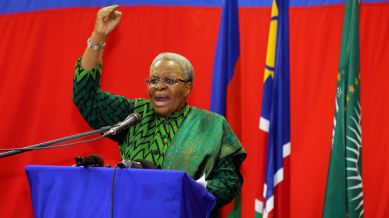Who is Netumbo Nandi-Ndaitwah, Namibia’s first female president-elect?
Known for her hands-on approach, she often describes herself as an 'implementer' rather than merely a politician.

Netumbo Nandi-Ndaitwah has made history as Namibia’s first female president-elect, securing 57% of the vote in the November 27, 2024, election. Representing the ruling SWAPO party, which has governed Namibia since its independence in 1990, she defeated her closest rival, Panduleni Itula of the Independent Patriots for Change (IPC), who received 26% of the vote.
Born on October 29, 1952, in the northern village of Onamutai, Nandi-Ndaitwah is the ninth of thirteen children in her family. Her father was an Anglican priest, and her early life was marked by political activism.
At just 14, she joined SWAPO during Namibia’s fight for independence from South African rule.
Education and early career
Nandi-Ndaitwah pursued higher education in Zambia, the Soviet Union, and the United Kingdom, earning advanced degrees in International Relations and Public Administration.
After Namibia gained independence in 1990, she returned to play a key role in nation-building, holding several significant ministerial positions throughout her career.
Personal life
She is married to Epaphras Denga Ndaitwah, a former chief of the Namibian Defence Force, and the couple has three sons. Despite her prominence in politics, Nandi-Ndaitwah maintains a relatively private personal life. Her interests include community work focused on children and reading, reflecting her dedication to social development.
Advocacy and leadership
Nandi-Ndaitwah is a vocal advocate for women’s rights. She was instrumental in passing the Combating of Domestic Violence Act in 2002 and has consistently pushed for gender equality in a traditionally male-dominated political sphere.
Known for her hands-on approach, she often describes herself as an “implementer” rather than merely a politician.
In her victory speech, she affirmed her commitment to addressing Namibia’s pressing challenges, including economic reform, unemployment, and social inequality. “The Namibian nation has voted for peace and stability,” she declared.
Her election is being celebrated as a transformative moment in African politics in terms of gender representation, while her victory has been contested by opposition parties citing alleged electoral irregularities.
(With inputs from Al Jazeera, BBC)